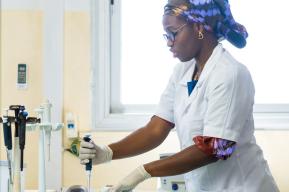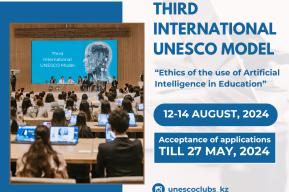Article
Commemoration of 100th death anniversary of Vilma Hugonnai, Hungary’s first female physician

Vilma Hugonnai was born in 1847 in Nagytétény (Hungary) and moved to Switzerland at the age of 25 to study medicine at the University of Zurich where female students were accepted. Back in Hungary in 1879, she had to wait 20 years for her medical degree to be recognized. During that period, she worked as a midwife, an author, a translator and a teacher.
Gabriela Ramos, UNESCO’s Assistant Director-General for Social and Human Sciences, opened the roundtable highlighting the underrepresentation of women in science, and especially in the field of artificial intelligence, in which women are only 22% of professionals, and even less in research teams - just 15% of the AI research staff at Facebook and 10% at Google. She stressed their crucial contribution to supporting societies and economies during the COVID-19 pandemic and their continuing to be underrepresented and their needs accounted for only to a limited extent.
The still large gender gap in science as in artificial intelligence means that we are losing the voices and ideas from women that would help us build better solutions for the challenges we are facing. Let’s walk the talk and ensure women are given equal chance to fulfil their full scientific potential, something that Vilma Hugonnai contributed to so strongly 100 years ago.
UNESCO’s stalwart commitment to women’s empowerment in STEM, especially in leadership positions, is embedded in two key instruments:
- Recommendation on Science and Scientific Researchers adopted in 2017 to advance a transformative vision of science anchored in human rights, equality and inclusion; and
- Recommendation on the Ethics of Artificial Intelligence adopted in 2021, aiming, inter alia, at tackling gender biases in AI algorithms and women’s underrepresentation in AI developing teams and corporate boards. A “Women 4 Ethical AI" project will soon further advance this work with Movimiento STEM+ in Mexico.
She was joined by Margit Batthyány-Schmidt, President of the Union of Hungarian Women, and László Turóczy, Ambassador and Permanent Delegate of Hungary to UNESCO, who shed light on Vilma Hugonnai’s impressive legacy and the challenges she faced, as well as those that women continue to face, despite tremendous recent progress.
Vilma Hugonnai’s passion and commitment - as a feminist and an activist for women’s voting rights and girls’ education - guided the discussion, moderated by Gabriela Ramos, during which renowned experts addressed the pervasive gender stereotypes and discrimination which, to this day, exist in scientific research and professions.
Zsófia Balogh, Project Leader at the Gustave Roussy Cancer Centre, stressed the need to include women and people of different ethnic backgrounds in medical trials to guarantee the safety and efficiency of treatments for everyone.
Éva Jakab Tóth, Research Director of the Center for Molecular Biophysics, and Andrea Somogyi, Beamline Scientist at Synchrotron Soleil, discussed the role and efficacy of quotas with Ms Ramos, and shared their experience of dealing with prejudice as high-level female STEM professionals.
Margit Molnár, Head of the China Desk at the OECD, highlighted how studies continue to prove that gender equality and diversity enhances productivity and leads to better results in any economic and research field.
Furthering women’s economic empowerment and leadership, in science and everywhere else, is one of the central objectives of UNESCO’s Transforming MEN’talities Initiative which aims at uprooting gender stereotypes and changing mindsets, policies and practices - with the proactive engagement of men and boys.
Since 1998, the L’Oréal-UNESCO for Women in Science International Awards have been granted every year to women researchers for their contribution to scientific progress.
An installation presenting Vilma Hugonnai’s outstanding life and work will be showcased from Tuesday, 28 June until Friday, 1 July 2022 at UNESCO Headquarters.







